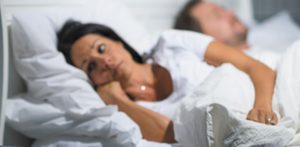By Anne-Marie Chalmers, MD
 It was a subject she normally felt too embarrassed to talk about — even with her physician. Now Harriet was so thrilled she had to share the good news with me!
It was a subject she normally felt too embarrassed to talk about — even with her physician. Now Harriet was so thrilled she had to share the good news with me!
“Instead of getting up three to four times a night to tinkle, I now only wake up once,” she explained. “Sometimes, I even sleep until 6 am. I feel like a new person!”
What Is Nocturia?
Harriet struggled with nocturia, a condition that requires getting up to urinate at least once during the night.
Surprisingly common, nocturia impacts millions of Americans. Between 2-28% of people between the ages of 20 and 40 are impacted by “clinically relevant nocturia,” which is defined as having to void at least two times per night.
For people over age 70, those numbers increase to 28-62%.
Health Issues Related to Nocturia
While nocturia often gets dismissed as a ‘mere nuisance’, it can significantly impact a person’s quality of life when experienced regularly. For many, sleep deprivation caused by nocturia can lead to fatigue, reduced productivity, mood disorders and impaired cognitive performance.
What’s more, needing to void at night often puts people at risk of falling and injuring themselves. It’s estimated that the US healthcare system spends $1.5 billion a year on nocturia-related hip fractures alone!
What Causes Nocturia?
While the prevalence and severity of nocturia correlate with age, frequent night-time urination shouldn’t be discounted as a normal part of aging.
This condition is typically described as a “multifactorial,” meaning several factors usually play a role. Common causes include everything from specific behaviors (like drinking too much liquid before bed) to underlying health issues like cardiovascular disease, diabetes, sleep disorders, urinary tract problems, and urinary infections.
Which Comes First: Poor Sleep or the Need to Urinate?
Nocturia is especially complex in that even when the apparent causes are addressed, many people still get up at night to urinate.
From a medical viewpoint, this begs the question: Is it the need to void at night that causes poor sleep? Or could it be that poor sleep contributes to having to get up to urinate?
If it’s the latter, focusing on sleep hygiene could have big payoffs for people struggling with nocturia.
Taking Control of Nocturia
Nocturia deserves more public attention and open conversation — especially because, in many cases, it can be helped by a variety of therapies.
One of those therapies might include the combination of omega-3s and melatonin. Indeed, one of the more interesting pieces of feedback that we’ve heard from users is that Omega Restore (a combination of omega-3s and melatonin) seems to reduce frequent urination at night.
Here is what we have learned about how melatonin and omega-3s may impact nocturia:
Melatonin Research
Often referred to as the “sleep hormone,” melatonin has a profound impact on our circadian rhythm. For people with certain sleep disorders, taking melatonin has been found to improve sleep quality. Since sleep disorders are strongly correlated with nocturia, it’s possible that melatonin could improve both.
Melatonin has also been found to reduce smooth muscle spontaneous activity in the bladder, which might reduce the urge to urinate.
Studies already show that older people with nocturia secrete less melatonin than normal. But the question of how melatonin supplementation impacts nocturia is still relatively new. To date, only a handful of small studies have tackled the topic. While the results look promising, more research is needed.
Omega-3 Research
Researchers also theorize that omega-3 fatty acids could make a difference for people with nocturia, for a variety of reasons:
. Reduce inflammation: Research shows that inflammation often plays a major role in overactive bladders. In clinical studies where anti-inflammatory drugs (NSAIDs) were given to people with nocturia, the NSAIDs reduced nocturia episodes and increased urinary retention. Since omega-3s work on the same biochemical pathways as NSAIDs, researchers believe omega-3 supplements could have a similar positive effect when taken in effective doses.
. Improve cell signaling: Omega-3s are also involved in the communication between cells. Without enough omega-3s, the body’s signaling pathways don’t function optimally. Case in point, one study found that the omega-3 signaling pathways often don’t work normally in older men with nocturia.
. Improve melatonin secretion: Omega-3s additionally influence our body’s relationship with melatonin. Animal studies show that low omega-3 intake is associated with dysfunctional melatonin secretion. Research also demonstrates that omega-3s help regulate the pineal gland, which is responsible for the production of melatonin at night.
The interconnectedness between omega-3s and melatonin could explain why one 2016 study found that people who ate the most fish enjoyed better sleep quality than those who rarely ate fish. This same study also showed that increased omega-3 intake positively influenced the circadian rhythm.
This article was abbreviated from a longer version published on omega3innovations.com. For the full text and references, visit:
https://omega3innovations.com/blog/can-omega-3-with-melatonin-
reduce-excessive-urination-at-night/
About Anne-Marie Chalmers, MD
Born and raised in the United States, Dr. Chalmers graduated from Brown University and completed her medical training at the University of Oslo in Norway. Dr. Chalmers practiced medicine in Norway for many years. Today, she serves as president of Omega3 Innovations.
OMEGA 3 INNOVATION
941.485.4400









